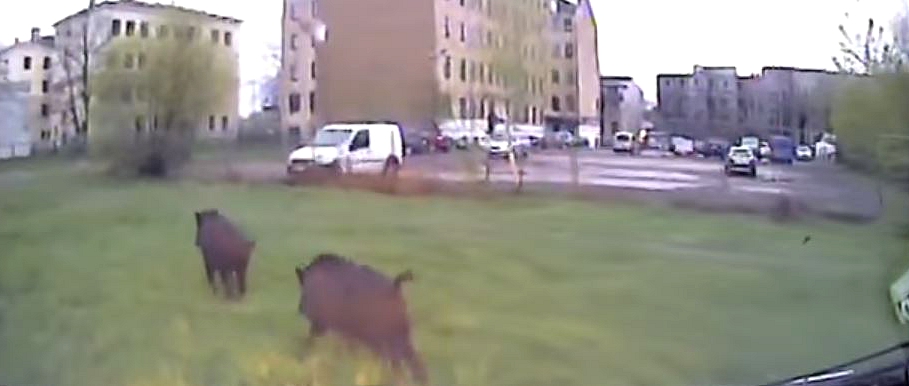"All of the Riga outskirts have been developed, so the territories where these creatures used to live are shrinking and they look for new places. In a 50-kilometer radius around the city the forests are being cut town and new developments built. Meanwhile the woods of urban Riga are calm and quiet,” the ranger explained.
As any kind of hunting within municipal boundaries is prohibited, the urban environment becomes a favorable habitat for the creatures, as they learn not to fear humans and know they will not be hunted.
Though wild animal incursions into the city have happened always, the issue has come to the fore recently because people have forgotten how to coexist with them.
“People are afraid because they don’t understand the animals. They’ve forgotten how to live alongside them. The situation with animals in the city has been around all the time. Every year young moose walk the highways, go to the sea to swim. A whole beach full of people standing and staring at the poor animal swimming, but it doesn’t even occur to anyone to clear the way for the moose to be able to walk back to the woods,” Vīgants said.
Another reason why the wild boar population has grown in the Riga woods is because the overgrown lakeshores at Jaunciems and Ķīšezers create favorable conditions for them to move in.
“These shores used to be well maintained, mowed and shepherded, now you’ve got reeds growing all the way up to the fences of homes. That’s where the creatures love to sleep and then go looking for a place to eat. And the closest place to eat is usually somebody’s vegetable garden,” he explained.
Meanwhile the newly-appointed Municipal Hunting Coordination Committee announced it would convene for its first meeting on Monday, June 15 to discuss the most humane solutions available for dealing with the city’s wild boar population.
The local government council says experienced hunters will begin tranquilizing and evacuating the boar to municipally owned woods located outside of city limits following the midsummer holidays at the end of June. A clean-up of lakeshores is also planned.
Mayor Nils Ušakovs said the city’s position is clear – the animals must not be shot. This is not just due to the ethics of humane treatment and environmental thinking, but a question of public health safety.
“First of all, even an experienced hunter can miss. Where the bullet goes afterward cannot be predicted. It’s dangerous in any inhabited area. Even in the deepest urban woods, like Biķernieku Forest, there are hundreds of Riga residents relaxing in there. If people were evacuated from there first, then the wild boar might likely decide to leave, too,” he suggested to national information agency LETA Thursday.
“I’d rather not imagine the situation where a wounded beast is charging through the yards of Jugla, with hunters in hot pursuit trying to shoot it down. It’s clear there will be no such hunts organized in town,” the mayor said decisively.
The city council has given the wild boar their own email address: [email protected], where municipal officials urge residents to report all incidents and encounters with wild boar in full detail. “This will help the hunters,” the mayor added.
The city council approved the make-up of the commission this Tuesday.






























